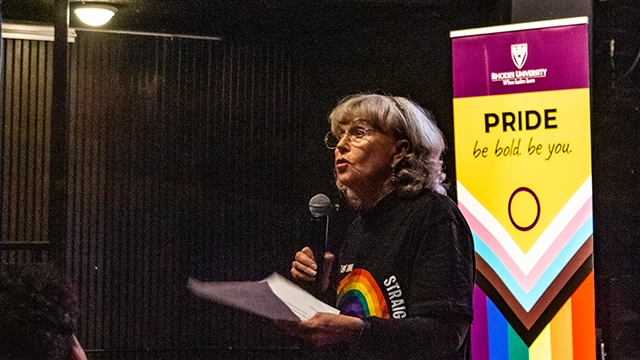
By Nizole Qete
The 2023 Pride Week opening brought together a diverse audience eager to delve into the intersection of LGBTQIA+ rights and religious interpretation.
Advocate Shuaib Rahim, Chair of the Pride Week Organising Committee and Senior Lecturer in Law, warmly welcomed and led the attendees through a profound journey into LGBTQIA+ history.
Adv Rahim shared his personal experiences and recounted the days when love between same-sex couples was deemed a criminal offence. The police were authorised to use deadly force upon mere suspicion. He reflected on the past, acknowledging the vital role played by the architects of the Constitution and the Bill of Rights in paving the way for LGBTQIA+ rights in South Africa.
Adv Rahim emphasised, "Had it not been for the genius and forethought of the architects of the Constitution and the Bill of Rights, we may not be here as we are today," he said.
Adv Rahim's historical context underscored the incredible progress made in South Africa regarding LGBTQIA+ rights. The 1996 inclusion of sexual orientation in the equality clause of the Constitution marked a pivotal moment in the nation's history. Before this, LGBTQIA+ individuals faced societal discrimination and the looming threat of criminal prosecution. As he spoke, Adv Rahim's words resonated with many in the audience, reminding them of the arduous journey to secure equal rights and protection for LGBTQIA+ individuals in South Africa. He highlighted the critical importance of the legal framework in ensuring justice and equality for all.
Following Adv Rahim's historical insights, Rabbi Prof Azila (Tzili) Talit Reisenberger, Head of Hebrew Language & Literature at the University of Cape Town, took the stage to deliver a captivating keynote address titled, "Homophobia: A Lazy Way to Interpret the Bible."
Rabbi Reisenberger challenged traditional interpretations of biblical passages often cited to condemn homosexuality. With profound scholarship and a deep understanding of religious texts, Rabbi Reisenberger dissected these verses, offering a fresh perspective emphasising love, compassion, and inclusivity. She argued that rigid interpretations have led to the misrepresentation of biblical messages.
Rabbi Reisenberger discussed specific verses, including Leviticus 18:22 and 20:13, traditionally used to condemn same-sex relationships.
Leviticus 18:22 - This verse is frequently invoked in arguments against same-sex relationships. It states, "You shall not lie with a male as with a woman; it is an abomination." Traditional interpretations have condemned homosexual relationships based on this passage. Rabbi Reisenberger remarked, "If the Bible law would have been against homosexuality, why wouldn't it say that a woman and a woman cannot have something together? Why do they only refer to the men? It is not against homosexuality. Because why would they prevent a man and a man? If they are against it, they should have said, and a woman should not lie with the woman".
Leviticus 20:13 - Another verse from the Book of Leviticus reads, "If a man lies with a male as with a woman, both of them have committed an abomination; they shall surely be put to death; their blood is upon them." This verse has been used to advocate severe punishments for same-sex acts.
"Leviticus 18:22 and 20:13 must be interpreted with compassion and empathy," Rabbi Reisenberger stated, "These verses should not be weaponised to promote discrimination; instead, they should guide us towards love, understanding, and acceptance."
Rabbi Reisenberger's reinterpretation challenged the conventional reading of these verses. She argued that these passages must be considered in their historical context, acknowledging that the time's societal norms and cultural beliefs significantly influenced biblical writings.
She emphasised that a compassionate interpretation could lead to more inclusive and accepting religious communities. She urged the audience to re-evaluate these passages, understanding them in their historical and cultural context.
Prof. Alan Kirkaldy, Head of the Department of History and the discussion's facilitator, summarised the evening's discourse: "Tonight's event serves as a testament to the progress we have made, both in acknowledging LGBTQIA+ rights and promoting a more inclusive interpretation of religious texts."
As Pride Week at Rhodes University unfolded, it became evident that the intersection of LGBTQIA+ identity and faith remain an essential topic for discussion and reflection.
The discourse initiated on this opening night provides valuable insights and a basis for continued dialogue. Rhodes University has a proud history of promoting diversity, inclusivity, and social justice.
In the words of Adv Rahim, "The law is a tool, and we have seen it used for gross evil and tremendous good. However, what good is that tool if people are not empowered and emboldened to use it?"
Rhodes University's Pride Week 2023 was a celebration and a platform for profound discussions, critical thinking, and a call to action to create a more inclusive and accepting society for all.
